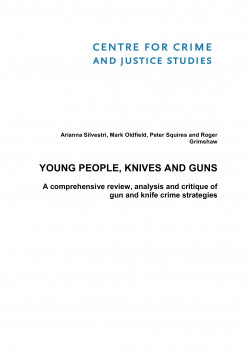Young people, knives and guns

There is little evidence to support police-led interventions to tackle knife violence, research from the Centre for Crime and Justice Studies has concluded.
Following a comprehensive review of gun and knife crime strategies, conducted for the Children's Commissioner for England, the report - Young people, knives and guns - concludes that a `zero tolerance' approach to weapon possession `is ineffective in reducing crime or changing attitudes' among young people.
It also casts doubt on the effectiveness of stop and search tactics and suggests `that police actions alone are unlikely to have a major impact on the carrying of knives'.
The research, one of the most comprehensive reviews to date of research on the effectiveness of approaches to gun and knife crime, examined evidence from the United Kingdom, United States and a number of other countries.
Among the key findings are:
- Focusing on the weapons themselves, rather than the underlying causes of violence, can become something of a distraction. Gun and knife crime need to be viewed in context, as expressions of wider phenomena of youth disaffection and violence.
- Violence is a complex product of inter-related individual, family, social, biological and environmental factors.
- Effective interventions appear to be holistic, engaging with the big questions of disadvantage and social exclusion, as well as addressing individual, familial and neighbourhood problems.
- Multi-agency, integrated strategies that are locally based and combine various approaches to prevention and suppression have proved more successful (at least as regards juvenile gun violence in the US) than enforcement-led interventions by agencies operating in isolation.
Arianna Silvestri, lead researcher on the report said,
'We were struck again and again during our research by how weak is the evidence base for current, police-led interventions for tackling gun and knife violence involving young people. Our research does not prove that such police-led interventions do not work. But there is no sound basis for believing that they have any long term impact.'
Dr Roger Grimshaw, research director at the Centre for Crime and Justice Studies, said:
'If the long term future of areas and neighbourhoods continues to create the conditions for the repetitive social exclusion of successive youth cohorts, then a core responsibility lies squarely on the shoulders of policymakers.'